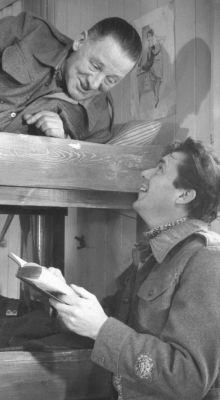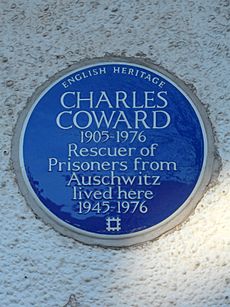Charles Coward facts for kids
Quick facts for kids
Charles Joseph Coward
|
|
|---|---|

Coward on the set of The Password Is Courage with Dirk Bogarde, who played him in the film
|
|
| Born | 30 January 1905 |
| Died | 1976 (aged 70–71) |
| Allegiance | |
| Service/ |
British Army |
| Years of service | 1937 to 1945 |
| Rank | Quartermaster Battery Sergeant Major |
| Battles/wars | Second World War |
Charles Joseph Coward (born January 30, 1905 – died 1976) was a brave British soldier during World War II. He became known as the "Count of Auschwitz" because he helped rescue many Jewish people from the terrible Auschwitz camp. He even said he snuck into the camp for a night to see the conditions himself. After the war, he shared his experiences at important trials, like the IG Farben Trial in Nuremberg. He is believed to have helped hundreds of Jewish prisoners escape from these camps.
Contents
Charles Coward's Amazing Story
Joining the Army and Capture
Charles Coward joined the British Army in June 1924. In May 1940, during World War II, he was captured by German forces near Calais. At the time, he was a Battery Quartermaster Sergeant with the 8th Reserve Regimental Royal Artillery.
Even before he reached a POW camp, he tried to escape twice! He made seven more escape attempts later. One time, he even pretended to be a wounded soldier in a German Army hospital and was given an Iron Cross award. While he was a prisoner, he caused a lot of trouble for his captors. He secretly planned several acts of sabotage during his work duties.
Life in Auschwitz
In December 1943, Coward was sent to the Auschwitz III (Monowitz) labor camp. This camp was about five miles from the more well-known Auschwitz II (Birkenau), which was a death camp. Monowitz was run by a company called IG Farben. They were building a factory there to make synthetic rubber.
More than 10,000 Jewish people were forced to work as laborers at Monowitz. There were also POWs and other forced laborers from all over occupied Europe. Coward and other British POWs lived in a smaller camp called E715.
Helping Others in the Camp
Because Charles Coward spoke German well, he was chosen to be a Red Cross officer for the British prisoners. This was a trusted job, and it allowed him to move around the camp quite freely. He could even go to nearby towns.
He saw trains full of Jewish people arriving at the death camp. Coward and other British prisoners secretly gave food and other items to the Jewish prisoners. He also sent secret messages to British officials. These messages contained military information, details about the conditions of prisoners, and the dates and numbers of trains arriving with Jewish people.
One time, a secret note reached him from a Jewish-British doctor held in the camp. Coward decided he had to meet him. He swapped clothes with another prisoner on a work team and spent a night in the Jewish part of the camp. There, he saw firsthand the terrible conditions. This experience later became a key part of his testimony after the war.
How He Saved Lives
Determined to help, Coward used Red Cross supplies, especially chocolate, to "buy" the bodies of prisoners who had died from the SS guards. These bodies included non-Jewish forced laborers from places like Belgium and France.
He then took the documents and clothes from these non-Jewish bodies. He gave them to Jewish prisoners who wanted to escape. These escapees used the new identities and were then secretly taken out of the camp. Coward did this many times and is thought to have saved at least 400 Jewish forced laborers.
In December 1944, Coward was sent back to the main POW camp at Lamsdorf (now Łambinowice, Poland). In January 1945, the POWs were forced to march to Bavaria, where they were finally freed.
After the War
After the war, Charles Coward gave important testimony at the Nuremberg war crimes trials. He described what it was like inside the Monowitz camp, how Allied POWs and Jewish prisoners were treated, and where the places people were killed were located. In 1953, Coward also spoke as a witness in a lawsuit where a former forced laborer sued IG Farben for payment and damages.
In 1960, he was featured on the TV show This Is Your Life.
His Story in Books and Film
In 1954, a book called The Password is Courage was published by John Castle. It told the story of Coward's brave actions during the war. This book has been printed many times and is still available today. On the back cover of the current edition, he is called "The Man who Broke into Auschwitz."
The book was made into a 1962 film, also titled The Password Is Courage, starring Dirk Bogarde. The movie was lighter in tone than the book and only briefly mentioned Coward's time at Auschwitz. It focused more on his many escapes and even added a made-up romantic story.
Awards and Recognition
In 1963, Charles Coward was recognized as one of the Righteous Among the Nations. A tree was planted in his honor in the Avenue of Righteous Gentiles at Yad Vashem, a memorial in Israel. In 2003, a blue plaque was placed on his home at 133, Chichester Road, Edmonton, London. This plaque remembers that he lived there from 1945 until his death. The North Middlesex Hospital also has a ward named "Charles Coward" in his honor.
In 2010, the British Government honored Coward after his death by naming him a British Hero of the Holocaust.
Questions About His Claims
Since Charles Coward passed away, some people have questioned parts of his story. One challenge is that there are no known surviving people who escaped with him. It's possible they were all recaptured. When researchers from Yad Vashem asked Coward about the identities of the escapees in 1962, he gave few details. He said, "It is not known exactly how many of these people regained their freedom, because some people went different ways and to different countries." He added that no records were kept because they were given new papers and names in their new countries. Some people believe Coward might have saved a few Jewish people, but perhaps not hundreds.
See also
- Arthur Dodd (Auschwitz survivor)
- Karel Sperber
 | Roy Wilkins |
 | John Lewis |
 | Linda Carol Brown |


